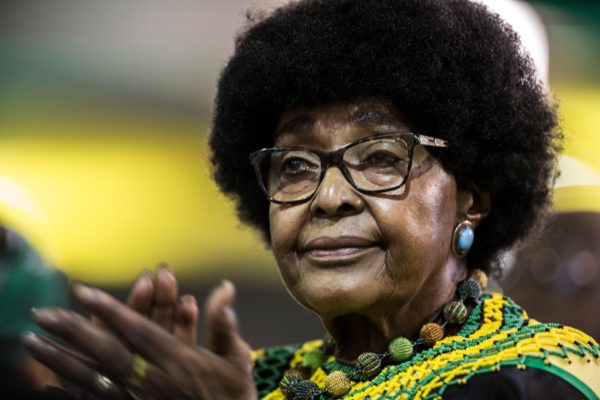
South Africa-based publisher Tafelberg has apologized for using unauthorized quotes by Sisonke Msimang, Palesa Morudu, and Redi Tlhabi on a new book on Winnie Mandela—Truth, Lies and Alibis: A Winnie Mandela Story, by journalist Fred Bridgland. The apology came days after Msimang and Morudu called out the move to use their words on the jacket of a book they had not endorsed without obtaining their permission, with Msimang describing Bridgland as an “Apartheid apologist.”
READ: The Resurrection of Winnie Mandela: Sisonke Msimang’s Second Book Is Out in October
Bridgland’s book is said to make “a strong case around the crimes that Madikizela-Mandela and her Mandela United Football Club are alleged to have committed and presents a mostly negative view of the freedom fighter.” The book, says Tlhabi, “lacks nuance, empathy, complexity and a sense of history,” and is “the antithesis of what I believe and the complexity that I embrace when analysing historical figures.” Here are the quotations by Msimang, Morudu, Tlhabi, and Aubrey Matshiqi as reported by The Independent:
‘Winnie was a woman of her times, there was a war and she too was a soldier.’
– Redi Tlhabi, Sunday Times.
‘Hers is a life worth examining for its courage, achievement and complexity.’
– Sisonke Msimang, Mail & Guardian.
‘We do history a disservice if we omit the truth about the characters and events that shaped democratic SA. So, we must accept that Winnie Mandela was both a heroine and a villain.’
– Palesa Morudu, Business Day.
‘… the story of Madikizela-Mandela is a story of many stories …’
– Aubrey Matshiqi, Business Day.
Here are Msimang and Morudu’s tweets.
It has come to my attention that a new book about #WinnieMandela written by an apartheid apologist has a blurb on the back taken from an article I wrote in the M&G. This is a sneaky marketing effort and I do not endorse the book. I will be writing to the publishers formally.
— Witch (@Sisonkemsimang) October 20, 2018
I have also checked with @BDliveSA to see if anyone gave Tafelberg Publishers any permission to use a quote from my column as ‘shout out’ for this book. I haven’t read the book. I am horrified that a quote from my Winnie column is used as a ‘shout out’. https://t.co/EgAlPhoKBq
— Palesa Morudu (@palesa_morudu) October 20, 2018
Redi Tlhabi followed with a justifiably furious letter.
“I AM APPALLED! HOW DARE YOU! HOW DARE YOU TAFELBERG!!!” she wrote, as reported by The Reading List. “You have been conniving and dishonest in appropriating a sentence from an entire article and placing it as a shout out for a book that YOU MUST HAVE KNOWN, was the antithesis of what I believe and the complexity that I embrace when analysing historical figures.”
She continues:
In Fred Bridgland’s book on Winnie Madikizela Mandela, you take a sentence in an article I wrote, and place it prominently at the back of the book knowing that readers will assume it would be interpreted as a ‘blurb’ or a ‘shout out.’ Even the most average reader would interpret a shout out as a statement of endorsement. People hardly write unkind shout-outs. It is not customary to spend time reading and writing shout- outs for writers who are not worthy of our time. A willingness to write a foreword or shout-out is an indirect endorsement and YOU KNOW THIS. So HOW DARE YOU!
Following the outpour of criticism, Talberg put a comment on a post about the development on The Reading List‘s Facebook page:
“We are in the process of making amends and are contacting the affected journalists,” they said. “We are removing the quotations from the cover for a new jacket for the book, and will replace it on the shelves with the rejacketed books wherever possible. The quotations will also be removed from online descriptions of the book.” They also sent tweets:
(1/2) Tafelberg apologises for the perception that has been created. The intention of the quotations on the back cover of Truth, Lies and Alibis is to show that there is a multiplicity of views of Winnie Madikizela-Mandela – and Fred Bridgland’s book is one of them.
— NB Publishers (@NBPublishers) October 22, 2018
(2/2) They don’t endorse the book or author in any way but are about Madikizela-Mandela as a person and historical figure. The sources – opinion pieces in Sunday Times, Business Day and the M&G – are clearly referenced.
— NB Publishers (@NBPublishers) October 22, 2018
The book, Tafelberg states, will now be withdrawn from bookstores and a new cover issued.
Meanwhile, back in July, we reported the coming of a different book on Winnie Mandela, one we strongly recommend: Sisonke Msimang’s own The Resurrection of Winnie Mandela. Following her death on April 2 of this year, Winnie Mandela’s legacy became the subject of a tussle between those who cast her as the tainted one in the shadow of her husband, Nelson Mandela, and those who have been fighting to reclaim her as the exceptional symbol of freedom and activism that she is. Msimang’s The Resurrection of Winnie Mandela aims to re-present Winnie Mandela in light of efforts to reduce her significance. The book, published on 24 October by Jonathan Ball Publishers, has been described by The Reading List as “a primer for young feminists, popular culture enthusiasts and those interested in the politics of memory, reconciliation and justice.”









COMMENTS -
Reader Interactions